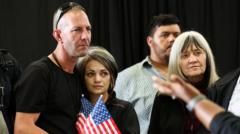A contingent of 59 white South Africans landed at Dulles Airport, Washington D.C., on Monday, having been fast-tracked to receive refugee status due to their alleged persecution. The Trump administration has characterized them as victims of "racial discrimination," citing rising tensions within South Africa. However, the South African government has firmly stated these claims are unfounded, arguing that the arrivals do not face the kind of persecution that typically necessitates refugee status.
This expedited process contrasts sharply with the Trump administration's decision to suspend all other refugee admissions, including those fleeing from conflict-torn regions. Human Rights Watch has condemned the administration's actions, labeling it a biased and politically motivated twist that leaves countless legitimate refugees in dire circumstances without recourse.
As the new arrivals were greeted warmly by U.S. officials—some waving American flags in a festooned terminal—the complexity of the situation shed light on broader issues of race and policy. Given the length of normal refugee processing, which can oftentimes extend to years, questions arose as to why this specific group received immediate approval. In response, President Trump mentioned a supposed "genocide" targeting white farmers in South Africa—a claim that South African President Cyril Ramaphosa has rejected as inaccurate.
In recent months, relations between the two nations dipped as tensions surged over land reforms aimed at addressing historical inequities stemming from apartheid. A recent report indicated that while black South Africans constitute a significant majority of the population, they hold a disproportionately small percentage of privately owned land, a legacy of apartheid policies.
Political analysts and organizations such as the International Refugee Assistance Project have voiced concerns over the implications of prioritizing one racial group over others. They have called the focus on Afrikaners hypocritical and reflective of a broader issue of racial bias within the U.S. refugee system.
Critics of the Trump administration's maneuver include members of Congress and various religious groups, with some warning that these policies are politically charged and serve to amplify racial divides rather than address the realities of refugee crises effectively.
This diplomatic strain has been further exacerbated by public comments from high-profile individuals, including South African-born Elon Musk, who have lent credence to the notion of targeted attacks against white South Africans, despite overwhelming data suggesting otherwise.
As this story unfolds, the impact of the U.S. policy on international relations and its long-term implications for both countries remain areas of concern and scrutiny.























